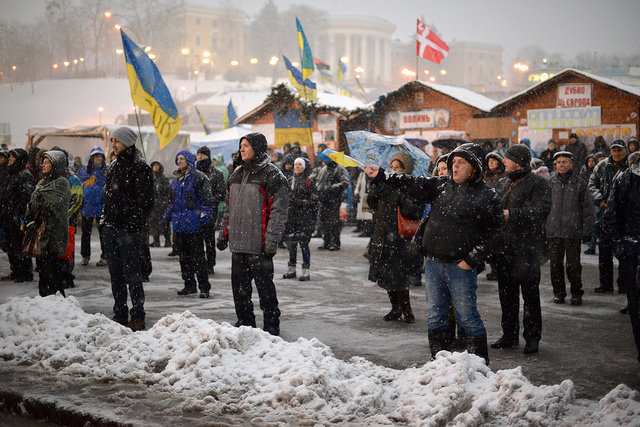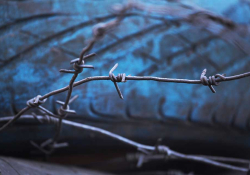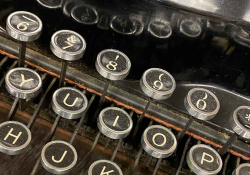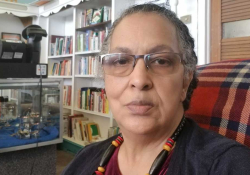Protesting on the Square in Kiev: Some Literary Insights

Editorial note: In solidarity with the protesters in Ukraine, WLT offers the following selections by Yuri Andrukhovych, which first appeared in our September 2005 issue. According to Michael Naydan, who guest-edited the special section on the Ukrainian avant-garde in that issue and wrote the lead essay, “Ukrainian Literary Identity Today: The Legacy of the Bu-Ba-Bu Generation after the Orange Revolution,” Andrukhovych has been most vocal in his support of the protesters and videotaped a call to people from Kyiv and surrounding areas to come to the Maidan (Independence Square) this past Sunday, December 8. His call was for people to support “freedom, independence and the European path for Ukraine.” Andrukhovych spoke to the crowd at the Maidan along with major political leaders (including Vitaly Klitschko and Arseniy Yatsenyuk). All three former presidents of Ukraine (Kravchuk, Kuchma and Yushchenko) have publicly thrown their support behind the demonstrators and support a European path for the country.
According to Professor Naydan, about a million people showed up for the protest march on the Maidan. Many of the marchers were heard chanting “slava Ukraini” (glory to Ukraine) in the metro, on buses, on the streets, and on the Maidan. The monument to Vladimir Lenin on Shevchenko Boulevard (which the regime has refused to remove, having designated it a work of art) was toppled and carried off by demonstrators. It obviously was a symbol of the Yanukovych regime and what it represents, a step back into the Soviet past.
Professor Naydan tells us he has received several emails from writers and scholars beginning with the chant of the demonstrators, “glory to Ukraine!” They also are extremely proud of those braving the cold and the Yanukovych regime’s threats of a crackdown. They want to get the message out for the US and Europe to isolate the Yanukovych regime and deny them travel visas and work toward freezing their foreign accounts. – Daniel Simon
The Viper
Yuri Andrukhovych
We spread over the oasis with a shriek on our return:
blood on our lances, with an eastern tan.
And the sealed city is like an island of lepers,
or a cage with a viper inside.
While we were gone, while a trumpet of victory
was piercing through us in the desert,
on pillars and wells, like salt on a kerchief,
a brand has shown through: a viper.
We lost the Saracen campaign.
No sign of victory anywhere.
No one to hear the knocking on our own doors,
and our motherland’s just like a viper.
Our maidens have withered in the towers and bowers,
belated caresses are all too cold.
In cold veins the ringing prime of life has died,
and a viper has appeared through their eyes.
She puts away the centuries like her eggs,
along the markets where the brass music’s playing,
where they live and fear, with the scaffolds of death,
where the rabble hisses like a viper.
What can I do? A throaty trumpet over me.
I’ve covered half the world or so.
I can only walk barefoot behind your coffin,
my beloved maiden, age-old motherland of mine.
Translation from the Ukrainian
By Michael M. Naydan
Editorial note: From A Hundred Years of Youth: A Bilingual Anthology of Twentieth-Century Ukrainian Poetry, ed. Olha Luchuk & Michael M. Naydan (Litopys, 2000).
* * *
The fiction excerpt that follows comprises an excerpt from Yuri Andrukhovych’s second satirical novel, The Moscoviad (1993), which follows the exploits of Ukrainian poet Otto von F. while on a writer’s stipend to study in Moscow—the hell-like capital of a decaying Soviet empire in its final days. The passage is rife with parody of Ukrainian national symbols, from the names of various regions of historical Ukraine; to the national emblem of the trident, which was banned in Soviet times; to the national folk instrument, the multistringed bandura; and to what some call the national drug of choice in Ukraine—salo, translated here as “pig lard.” The passage is untitled in the original.
The Dream of King Olelko
Friday night I dreamt I was having dinner with King Olelko II (Dovhoruky-Rurikovych) of Ukraine.[1] The two of us are sitting at a well-appointed table in a baroque loggia made of azure stone, from time to time tranquil servants appear, mostly Indians or Chinese, with gilded tridents on the lapels of their waistcoats, inconspicuously exchanging serving dishes and plates, dishes, knives, forks, pincers for breaking crab shells, pincers for pulling out mollusks, scalpels for dissecting frogs, in the same way inconspicuously, without any clatter, they exit. From the loggia luxurious views open up: the sun is setting somewhere on the waters of a clear lake below, for the last time the virgin peaks of the Alps blaze with a twilight luster, if we’ve gone this far already, then maybe even the Pyrenees. The King and I drink up all manner of expensive wines, cognacs, fruit and flavored liqueurs, and we prattle about this and that.
“Your Royal Majesty,” I address him, filled with respect, “Sovereign and Ruler of all Rus-Ukraine, Grand Prince of Kyiv and Chernihiv, King of Halych and Volynia, Lord of Pskov, Przemysl and Koziatyn, Duke of Dniprodzerdzhinsk, Pervomaisky and Illichivsky,[2] Great Khan of Crimea and Ismail, Baron of Bordichev, of Both Bukovyna and Bessarabia, and also the Ruler of New Askania and Kakhovka, Archsenior of the Wild Field and Black Forests, Hetman and Protector of the Don, Berdiansk and Kryvoryh Cossacks, All Vigilant Shepherd of the Hutsuls and Boikos, Master of the Entire Ukrainian Nation including the Tartars and Pechenegs, and also the Little Khokhóls and Piglard Eaters, and all the Moldavians and Janissaries, who exist in Our Land, of Greater and Lesser Slobodian Ukraine, and also Patron and Shepherd of Inner and Outer Tmutorkhan, descendant of a glorious 1000-year-old ancestry, in a word, our splendid and most worthy Monarch, Your Eminence, would you not want to remain forever in the golden scrolls of universal and human memory?”[3]
“I wouldst,” Olelko the Second speaks, “what actions must I taketh?”
“Such actions,” I answer, “through which all kings haveth always enjoyed never-ending glory.”
“Perhaps you mean war?” Olelko asks, bringing his thousand-year-old eyebrows together and furrowing his noble brow.
“Even a fool can attain it through war, my Lord, even a president.”
“Then through laws and wise codices, regulations and honorable charters,” Olelko surmises.
“That’s assholic, Your Eminence, that’s what madmen and deputies in parliament are for,” I further intrigue him.
“Then, perhaps, through a scandalously large quantity of wives and concubines, through loud drinking bouts and boisterous beatings, through extravagance and gluttony, and rapes as well as other unnecessary things of so little respect?
“That’s nothing new, Grand Prince, all the same you won’t surpass what the Commune has done in any of these,” I torment him as much as I can.
“Then do not torment me and just say through which kind of actions? “ Olelko the Second requests and to some extent commands.
A Malaysian servant clears away the last plates from in front of us, a bowl with living, still squeaky, leftover oysters, empty bottles of malmsey wine, imiglikos and Keller-Heister. In place of them the Ethiopian servant brings candles in bronze candelabras and a black ebony box, filled to the brim with the best brand of cigars. It grows dusky. Aromas from somewhere in the Alpine mountain valleys waft to us. Below, underneath the loggia, a fountain sings, or perhaps it’s a stream. Two small Black boys bring in a blind bandura player by the arms. The King and I smoke, and the bandura player tunes his strings barely audibly, having sat down on a stone ledge next to a bas-relief depicting a dancing faun. The first stars are appearing in the sky.
“Tell me, then, you rag, what you want to advise me?!” The king began to stew, irritated by the meaning-laden puffing of my cigar.
“Be patient, Your Synodality, and indulgent,” I say to this. “Do not do insult even to a shitty insignificant bug. Attend Mass on Sunday, but do not forget your daily prayers. Give your estates to the poor, give out smiles to widows and orphans, do not kill stray puppies. Think about the grand and beautiful, say, for example, my poetry. Read my poetry, eat my body, drink my blood. Give me a stipend, say, in German marks, and send me off to roam around the globe. In half a year Your Most Radiance will receive from me such a glorious panegyric that it will uplift You above all other monarchs. In yet another half year the people of Ukraine will demand that you return, and as a result of a successfully concluded referendum, You will ride into Kyiv in a white Cadillac. Verily, verily I say unto You: grant me a stipend!”
The blind bandura player plays on and on, warbling about something, the water below, in the eternally green myrtle, is gurgling and calling for a trip around the world. The stars in the sky become even bigger, closer, on them you can even make out some kind of cities, fairy-tale manchineel forests, wondrous palaces, columns, towers. Their glow promises so much that you feel like jumping out headfirst from the loggia and, as the poet once said, at least die just a little bit.
“For nothing in this world is as superfluous, senseless, and comic as good poetry, but, at the same time, nothing in this world is as necessary, meaningful, and indispensable as it, Your Great Ukrainianness. Consider also the history of all great nations, and you’ll be convinced that this is the history of their poetry. Consider also the history of small nations. The ones that will no longer be after tomorrow. Consider and tell me: who is more needed by whom—kings for poets or poets for kings? Are kings worth anything without the poets? Do not kings exist by God’s will just for maintaining the poets by God’s will?
The platan trees are rustling in the thickening shadows, candles are flickering, monasteries ringing, girls are singing as they walk. Unfamiliar nocturnal birds and maybe even bats are flying around the loggia. From the distance, sweet anxious aromas waft to us.
The King drinks up icy champagne from a goblet on a really tall Masonic leg and utters—slowly, wisely, weightily: “Do you know how to say “pr**k” in Spanish?”
“Why how, Your Eminence?” I ask, with keen interest.
“Pinga!” The King screams out and slaps his palm.
Then two long-bodied Senegalese grab me by the shoulders, by the arms, and drag me from the loggia downstairs. I fly and suddenly recall that his real last name is “Anzhuisky.” Scratching up my mug on the eternally green undergrowth, I sense the bandura player with a gray scalplock tearing up and sobbing bitterly.
Twisting your mouth and spitting, and fiercely hating yourself, you remember that dream until you tire out doing your strength training exercises on the floor. Do you have to sell yourself this way? Unpardonably, shamelessly, cynically. “Give me the stipend, Your Sovereignty, give me the sti—” What vile and low servility of the spirit, what inner prostitution!
Translation from the Ukrainian
By Michael M. Naydan
1 Dovhoruky (Dolgoruky in Russian) was the Prince of Suzdal and Grand Prince of Kyiv. He is considered to have been the founder of Moscow in 1147. Rurik was the Varangian warrior who founded the princely dynasty of Kyivan Rus. His lineage marks the Rurik Dynasty in Russia, which lasted until 1598. Rurikovych is the patronymic form meaning “son of Rurik.” Olelko Volodymyrovych (ca. 1443–55) was an actual Ukrainian prince who during his time strove to make the Kyivan principality an autonomous entity under Lithuanian rule.
2 Pervomaisky means “First of May”—and hearkens to the Soviet penchant for the naming of towns and people after formative moments or important individuals in Soviet history. Illich is the moniker taken from Lenin’s patronymic (i.e., the son of Ilya), by which he was both fondly as well as pejoratively known.
3 The Russian pejorative word for Ukrainians. Ukrainians were also called “Little Russians” by the Russians in the eighteenth and nineteenth centuries.
Born in 1960 in the city of Ivano-Frankivsk, Yuri Andrukhovych is one of Ukraine’s premier writers and the “patriarch” of the Bu-Ba-Bu literary performance group that reenergized Ukrainian literary culture in the late 1980s and 1990s. He is the recipient of the Herder Prize (2001) and the Antonovych Prize (2001) in literature. His four published novels include Recreations (1992), Moskoviada (1993), Perverzion (1996), and The Twelve Rings (2003). He has authored four books of poetry and a book of essays, Disorientation in Locality (1999). Translations of his poetry and prose have appeared in many literary journals in North America and Europe. Andrukhovych is also an accomplished translator of the Beat Generation writers, the New York School poets, and Shakespeare’s Hamlet into Ukrainian, and he is the literary editor of the cyberjournal Train-76.
Michael Naydan is Woskob Family Professor of Ukrainian Studies at Penn State University and the translator of about twenty-five books (from Russian and Ukrainian) into English.









